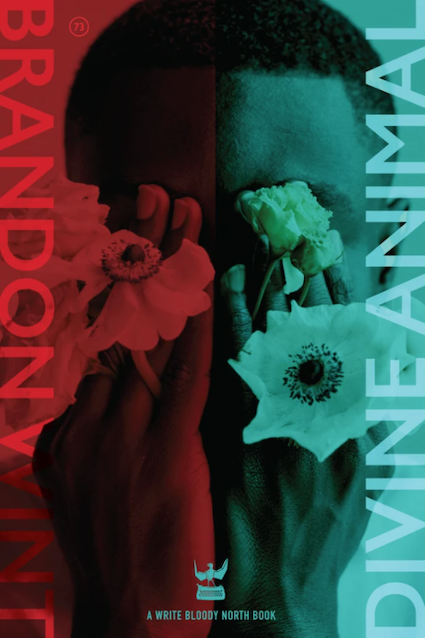
Divine Animal
Brandon Wint
Write Bloody North, 2020
Review by Erin Kirsh
Brandon Wint’s inaugural collection, Divine Animal from Write Bloody North, can be described in four words: heavy impact, gentle touch.
I first heard Brandon Wint perform poetry at a small venue in East Vancouver in 2011. I was one mason jar into Café Deux Soleils’ legendary sangria when Wint took the stage. From the moment he began speaking, my arms were alight with goosebumps. Wint has always had a remarkable gift for delivering visuals, perhaps because he is such a keen observer of the world. Wint pays attention. He catches quirky specifics and like a wizard of mental origami, crafts them into poignant revelations.
This talent is well showcased in Divine Animal. The work tells of a kind and thoughtful witness who is able to collect chaos and make of it a mosaic, unifying the disparate around a theme. Wint takes moments one might easily overlook and alchemizes them into crystallized poetic beats. From “Jamaica, Humbly”:
More birds than I can name
sing into twilight’s slow unfolding;
crickets tuck their harp music
between drooping bows of grass.
And it isn’t just the small and peaceable moments that Wint excels at putting words to. Divine Animal reckons with ancestral and colonial legacies and the ache brought on by the ongoing global climate catastrophe. Courageous in the face of violent histories, Wint’s collection does not shy away from grief, but it dreams of softer days to come. This is beautifully illustrated in “Incantation: Memory of Water”:
I mean oceans too, of teeth and eyes,
of faces and bracelets lost. Bodies. Entire bodies
whose names are drowned. Who groan
in the imperfect recall of textbooks
whose sunken lips tableau the lost languages
that make me say Barbados and Jamaica
in their absence.
And in “Devotion”:
Every day is a new prayer I touch
and lift gently as an injured bird
into the physics of my desires.
This marriage of sorrow about what is and has been and hope for what will be is expressed not only in what Wint writes about, but in how he chooses to write about it. These poems carry a real sense of momentum, pushing forward toward what’s next. This is visible in Wint’s emphasis on sonic elements like consonance and assonance. From “Nightmares”:
if the claws of sparrows
could grasp a noose of light
they might choke themselves flightless
rather than batter themselves stiff
against the glass towers blighting their moon.
The rhythm is undeniable; the like sounds ferry the reader forward as if on a current. The fingerprints of a spoken word background linger throughout the pages of Divine Animal. Another popular poetic technique for performance poets is repetition, often in the form of a hook that serves to gather the audience back into the proverbial arms of the poet. In Divine Animal, repetition takes the form of a particular leitmotif. At least one, but often more, of the four elements recur in nearly every poem, either as the poem’s subject or imagery. This device has a building effect, which is apt, as calling back moments from past poems mirrors the theme of how legacy casts echoes through to the present. The weaving of this image system throughout the collection draws links between poems and speaks to another central philosophy of the book, which is the connectedness between all things. Further, choosing the four elements to be this repetition nods to still another key tenet of Divine Animal: that staying rooted in the natural and knowable world is a pretty good way to find the divine.
For me, the poem “Birth/Right” delivers lines that almost serve as a kind of thesis for Divine Animal:
There is no animal to lowly
to touch life’s majestic head.
[…]
The universe is mostly a cold
and unknowable place,
yet somehow I am not.
The spoken word icon’s long-awaited book is both bomb and balm. Brandon Wint’s Divine Animal is a celebration of all of the beauty life is and all the brightness it could be.
Erin Kirsh is a writer and performer based in Vancouver. A Pushcart Prize nominee, her work has appeared in The Malahat Review, Barren, Arc Poetry Magazine, EVENT, CV2, Cosmonauts Avenue, QWERTY, The Dalhousie Review, PULP Literature, and Geist, where she took second place in their postcard short story contest. Visit her at www.erinkirsh.com or follow her on Twitter @kirshwords.